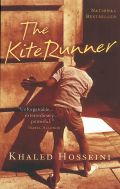Wednesday, May 24, 2006
Oh, Baba
 THERE'S SOMETHING ABOUT BOOK COVERS THAT COMPELS me.It is an admittedly guilty pleasure of mine that I will indulge more than a few moments wondering why a publisher picked a particular image for a certain book. For the copy of The Satanic Verses I picked up, it was butterflies. For The Stone Diaries, it was flowers. For A Complicated Kindness, it's some inscrutable rooster and axe thing. And for Khaled Hosseini's The Kite Runner, the Canadian edition picks the seminal moment of the whole novel, the one we are forced to come back to again and again... a boy of about 12 staring into an alley, his finger bandaged...
THERE'S SOMETHING ABOUT BOOK COVERS THAT COMPELS me.It is an admittedly guilty pleasure of mine that I will indulge more than a few moments wondering why a publisher picked a particular image for a certain book. For the copy of The Satanic Verses I picked up, it was butterflies. For The Stone Diaries, it was flowers. For A Complicated Kindness, it's some inscrutable rooster and axe thing. And for Khaled Hosseini's The Kite Runner, the Canadian edition picks the seminal moment of the whole novel, the one we are forced to come back to again and again... a boy of about 12 staring into an alley, his finger bandaged... Last week, our parliament debated whether or not to renew Canada's commitment in Afghanistan for an additional 2 years, until early 2009. Given the complexities of the situation and the growing debate about our role there, it is worth talking about what exactly we are fighting for (and against), especially considering many of the Tim Hortons-starved Canadian soldiers in the country at the moment are from Edmonton. At the heart of this debate is an important question: does Canada's mandate within the US-led 'reconstruction' mission there reflect the defense and support of Afghani rights, freedoms, and values, the assertion of our own on a global stage, or something in between, and if so, what?
The Kite Runner, salivated over by book clubs across the continent (mine no less) is an 'in,' of sorts, for North Americans, into Afghan culture and history. It is a story about fathers and sons, about friendship, about the ties that bind us to each other, about forgiveness, and most of all, redemption. It is not The Power of One; this is not an uplifting novel and it is unlikely to leave you with any warm, tingly feelings. But Hosseini's tight prose, mouth-watering immersion in the kabob, naan, and rose water of Kabul, and gentle allowances for his characters make this meditation on the nature of goodness worth picking up.
Amir, the main character, is not a straight-forward protagonist. When we meet him in 197os pre-Soviet Afghanistan, he is a young boy, the son of a wealthy businessman in the capital, Kabul, an avid reader, and an achingly lonely boy seeking his Baba's forgiveness for the death of his mother in childbirth. For all his desperate attempts to please his father, he is unable to rouse the love in him he so richly craves, and it is perhaps this disconnect that informs the other most important relationship in Amir's life -- that to their servant's son, Hassan. While Hassan and his father Ali are Hazaras, members of a low-caste ethnic group in Afghan society, they have an intimate bond with Amir and his father, both Pashtuns, the ruling class at the time and most predominant ethnic group. In school, Amir learns Farsi poetry, from Rumi to Khayyám, and at the top of the hill near the house he reads Hassan, who cannot go to school, their favourite stories under the pomegranate tree, where their names are neatly carved with the inscription 'Sultans of Kabul.'
Though Amir never calls Hassan his friend and is quick to abandon him if guests are over, his first memory is of Hassan's 'china doll face,' his chin, his squarely split harelip, and indeed Hassan's first word is Amir's name. This is where the crux of the story lies. Early in the novel, Amir's father is talking to his best friend and business partner, Rahim Khan. His father says he's concerned Amir doesn't fight back when the neighbourhood boys push him around -- he lets Hassan do the fighting for him. 'He's missing something,' he says. 'Yes, a mean streak,' Rahim Khan counters. Frustrated, his father says, 'A boy who won't stand up for himself becomes a man who can't stand up to anything.' This discussion, it seems, is one Amir cannot reconcile either. Later, he tests Hassan's loyalty to him playfully, and asks if the boy would eat dirt if he asked him to. There is a flicker in his eyes, something Amir doesn't yet understand, but he replies simply, 'If you asked, I would. But I wonder, would you ever ask me to do such a thing, Amir agha?'
Again and again, this question of Amir's integrity, of standing up for what is right and against what is wrong, emerges. What happens that winter unravels his simple life in Kabul, and that of his family, and he is forced, on the day of the biggest kite flying contest of the year, to ask himself if sincere and brutal betrayal is worth a taste of his Baba's undivided love at last.
In 1979, the Soviet Union invaded Afghanistan to prop up the Marxist government, which had come to power the year before after then-President Sardar Muhammad Daud Khan was assassinated. His government had come to power in 1973 after the king was ousted in a 'bloodless coup;' this battle for power, though, was not so kind. Soviet tanks still litter the country, and some authors believe it was this bloody and costly war against anti-Communist guerrillas, who could attack virtually unseen from the mountainous landscape above the few paved roads, that started the empire on its swift decline in the 1980s. But for Amir and his father, it spells an urgent exodus to America, and much of the rest of the novel takes place in California, as they struggle to build a new life from scratch in an unfamiliar culture and new tongue.
Michael Ignatieff, a human rights professor and one of the few fluently bilingual candidates in the Liberal leadership race this year, asserts that Canada's role in Afghanistan today is 'a test' of a new kind of mandate for our country. The war fought there following the September 11th, 2001 attacks in the United States bombed the Taliban out of Kabul, certainly, but President Hamid Karzai's current government has far from absolute control over the country. Canadian troops are engaged in Kandahar, a northeastern province near the border with Iran where the Taliban still have a firm hold, and we are unlikely to be leaving anytime soon. What Igantieff coyly argues is that Canada's new role there should be a balance between humanitarian assistance and active military intervention under the auspices of the NATO mission. He voted in favour of the Conservatives' successful bid to extend Canada's mission last week, as did many other Liberals, including acting leader and former Defense Minister Bill Graham (whose Toronto constituency a certain rollerblading reader may be familiar with), a strategic move as much as anything, since the Liberals discussed a very similar piece of legislation just last year.
This weekend, I had a chance to watch Nelofer Pazira in the movie Kandahar. An Afghan-Canadian journalist, the movie is based on her story of receiving a desperate letter in 1998 from her childhood friend in Kabul, seeming to say she was about to commit suicide because her life was no longer worth living. Pazira stars as a woman crossing the Iranian border through refugee camps under very similar circumstances, and is fierce amid a country utterly unfamiliar to her. Amir, receiving a message from Rahim Khan one day telling him 'There is a way to be good again,' makes a journey of his own back to his home. In early 2001, the Taliban, who were first welcomed by many for bringing stability to a country being torn apart by feuding warlords in the early 90s, have transformed the land of his ancestors into something he does not recognise. No more kites, kabob, or pictures of Bollywood actresses to be traded and compared among boys. Yet today, four and a half years after US-led forces invaded with the assistance of Northern Alliance troops in December of 2001, when the burqa, which hid so many Afghani women beneath a veil and made them all but invisible in Afghan society, has ostensibly been lifted, the country continues to face significant development challenges.
On Sunday, Canadian officials announced a new aid project designed to give the power to allocate development resources to local leaders and communities in Afghanistan. The project, under the auspices of the Canadian International Development Agency (CIDA), aims to emphasise local consultations in the decision-making process surrounding the allocation of $900 000 in funds set committed for Shah Wali Kot district. It is an intriguing new idea, and given the $4 billion already spent to fund military operations, perhaps a sign that meeting the basic needs of the people living there in a participatory manner is gaining precedence alongside building bunkers and buying shells.
I wonder, though, if anything will humanise the media's portrayal of rebels fighting NATO-led troops in Afganistan today. As Canadian forces have taken command of NATO missions there in the past few months, the Canadian media has increasingly depicted the soldiers on the other end of the guns sending Canadian troops home in coffins and destroying local infrastructure as faceless 'insurgents' (which is not to say that the deaths of Canadians in Afghanistan are worth any more than the countless civilians dying in this war on a regular basis). The word 'insurgent' is right up there with 'extraordinary rendition' in meaningless, dehumanising doublespeak. It manages to strip the Other of any grievance or reasoning, while heroically legitimising anyone on the friendly side of the front lines, a dangerous path to set upon from any perspective.
The Kite Runner tells the story of a boy growing into a man and wondering if he will ever have the courage to stand up for what he knows to be right, and if he can ever be forgiven for the terrible events of that winter that tear his life, and Hassan's, apart at the seams. It is worth discussing what is right in Canada today as well, and certainly worth stepping back and assessing if sending bombs hand in hand with aid in Afghanistan is the appropriate approach for us to be taking. It is worth remembering that Ignatieff's 'test' involves the lives and futures of real people, and that our actions today will have real impacts in the years to come.
Labels: afghanistan, books, canada, war
posted by Christopher at 5:37 p.m.
0 Comments:

This work is licensed under a Creative Commons Attribution-Noncommercial-Share Alike 3.0 Unported License.


